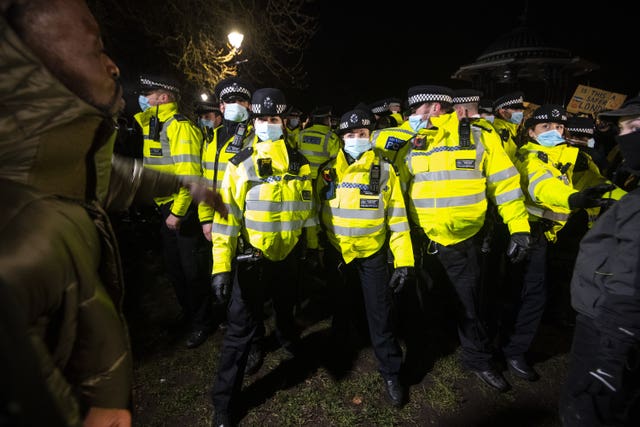A watchdog has backed the Metropolitan Police over its handling of the Sarah Everard vigil, saying officers were not heavy handed and remained “calm and professional”.
But campaigners and those who witnessed the police violence on the ground have slammed the report as ‘rubber-stamping’ and described the police’s behaviour as “shameful”:
In a shock to absolutely *nobody* who has dealt with British policing for any length of time, the inspectorate has done what was expected of it and rubber-stamped the Metropolitan Police's shameful conduct at the Sarah Everard vigil on 13 March at Clapham Common @SistersUncut https://t.co/tCL5PQTOgs
— Netpol (@netpol) March 30, 2021
The Metropolitan Police came under fire after officers waded into the peaceful vigil and attacked protesters. One person who was at the event stated:
I was shocked at the level of aggression they used to push through and it felt like…something must have happened. And nothing had happened…they just decided to take the girls that were talking on the bandstand and to arrest them and take them away.
“There was no reason for this”
Meanwhile, the Black Protest Legal Support UK group set out why the report contradicted what they observed on the ground:
The @CommonsHomeAffs inquiry into #ClaphamCommon took place last week. One of our Legal Observers on the ground @g__ferris gave evidence to the committee outlining what we saw when monitoring the police. He was in the bandstand for the majority of the evening with one other LO
— Black Protest Legal Support UK (@blkprotestlegal) March 30, 2021
Around 6.30pm, 10-12 police officers came pushing onto the bandstand, shoving people quite aggressively. In doing so, the police pushed people closer together, crowded the area and started physically removing people from the bandstand.
— Black Protest Legal Support UK (@blkprotestlegal) March 30, 2021
There was no reason for this. Black Protest Legal Support has always been clear that no current or future legislation can impose a blanket ban on protest, as protected under Arts 10 & 11 ECHR. We know that restrictions on protest sharply affect Black, Brown & Racialised Groups.
— Black Protest Legal Support UK (@blkprotestlegal) March 30, 2021
HMICFRS
The report was written by Her Majesty’s Inspectorate of Constabulary and Fire and Rescue Services (HMICFRS). It was called in to examine the force’s actions after women who attended the event on 13 March were bundled to the ground and arrested.
But it perhaps shouldn’t be a surprise that the HMICFRS report has whitewashed what happened on Clapham Common. After all, it was a recent HMICFRS report that concluded the police had gone too far in allowing protests to happen. As Tom Coburg highlighted for The Canary:
The HMICFRS recommendations, when combined with changes proposed by the Police Bill, arguably amount to a ban on all meaningful protests. In short, if a protest – whether static or otherwise – isn’t approved by the police or other state agencies, then those taking part – ‘aggravated’ or otherwise – could face lengthy jail sentences, and likely consequential blacklisting.
This could be the future of UK policing.
Or to paraphrase the words of George Orwell: if you want a picture of future policing, imagine a boot stamping on a human face — forever.

















